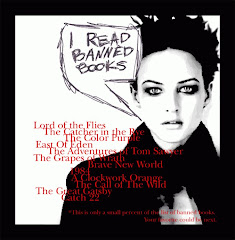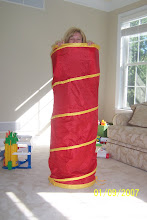Banned Books week may strike up controversy in the literary world. We, as librarians, believe that access should not be restricted to patrons; however, as humans, we do feel the need to protect those who cannot protect themselves. As I stated in an earlier post, most challenges are done so in the best interest of a child. In asking which other groups could challenge material, one responded with religious groups which is rightly so. In addition, racial issues is a popular challenged subject. A newer subject for challenge is on gender or sexual orientation dealing with mostly the rights of gays and lesbians (Rubin, 207). In conclusion, however, most want to protect children from potentially harmful material.
We, as librarians, are no different from society in having special concern for children. In contrast, the American Library Association's (ALA) policy called Free Access to Libraries for Minors states that library materials are not to be restricteed on the basis of the patron's age. The association "opposes libraries restricting access to library materials and services for minors and hold that it is parent - and only parents - who may restrict their children - and only their children - from access to library materials and services" (Rubin, 206).
With this information, I began thinking: How do librarians regulate/organize the issue of questionable material for children? Many questions on this topic vary depending on the type of library.
If a younger patron comes into your library wanting a book you may think is inappropriate, what do you do if the parent is not present? How would you feel as a parent if your son or daughter brought home a book you wouldn't approve of?
In a school library, how would you address this issue if a parent confronted you? Would you inform all parents at the onset of the school year about your and the school's policies?
Rubin, R. E. (2004). Foundations of library and information science (2nd ed.). New York: Neal- Schuman Publishers.
Subscribe to:
Post Comments (Atom)


6 comments:
I think it's important to have ongoing and open dialogue with parents regarding school policies and the freedom to read. I think, personally, that unless a student has presented a signed parental request that requires parental permission for books, or limits certain books for that child, they should have the freedom to check out any material on the shelves. I would suggest making such a form available to parents in tandem with an introductory letter outlining some of the highs of the library collection.
I think parents should be aware of the school's policy on material and intellectual freedom. As a parent I think that it is scary that my child could go and find information that I think is inappropriate for them. It is better for them to know ahead of time so they can make informed decisions. Of course, this could cause an uproar as well, so I'm sure there is a fine line to walk.
Thanks.
If a child came up to me and asked to check out an inappropriate book I would suggest and take them over to the children's section. I would strike up a conversation with them and discuss their interests and go from there.
If a parent confronted me about a book I think I would try to have someone there as a witness. Then, I would try to explain the book and why I feel that it is not so bad.
Luckily, at my school as long as a book receives board approval it can be part of our curriculum, and it doesn't need approval just to be in the media center. We teach TKAM and Catcher every year just to name a few. I personally do feel that certain books, those which preach hate of any kind, should be banned, but otherwise, I think that everyone has a right to his/her opinion.
Thanks for the information! Great blog, Janet
You all make valid points! Another problem arises with a school library versus a public library. Some made comments of how they would handle this in a school situation or how their board approves materials, but how do public libraries facilitate these fine lines of book banning. I think there is a huge struggle between morals and ethics versus the freedom to information!
Jessica
I am with leeann. I would talk to the child about what kind of books they are looking for. With kids third grade and under they often don't know what's in the book - they are just going on the cover. Fourth grade and up they could be looking for those controversial topics...
I have had conversations with parents of the younger kids but I haven't had a parent of older kids challenge a book. I would explain why we have the book and tell the parent to tell their child what they are allowed to check out. Leave it up to them to inforce it.
Post a Comment